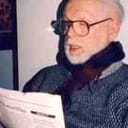Stay in the Loop
BSR publishes on a weekly schedule, with an email newsletter every Wednesday and Thursday morning. There’s no paywall, and subscribing is always free.
All that wit, all that pain
Dorothy Parker beneath the surface

Every morning at 9:15 except Sunday, I hike five minutes to the Student Center of the Anna Amalia Library in Weimar to read the Herald Trib and the London Guardian. Seated opposite me for some years now has been one 60ish retired chemist from Munich doing the German dailies. We've gotten in the habit of serving as talking reference books for each other as our reading requires. He's better than any German dictionary; and I readily illuminate most American references for him.
Such as the other day, when he queried, "Who was Dorothy Parker and what was the Algonquin Round Table?" I explained that in the 1920s the Round Table at the Algonquin Hotel was the watering hole of New Yorker writers who relished three-hour lunches and liked to dazzle each other with their wit.
For example, there was an egghead game in which they asked each other to put strange words in a new sentence. Dorothy Parker at once complied with "horticulture": "You can lead a horticulture, but you can't make her think."
I always enjoy remembering her half-aphorism: "Men seldom make passes at girls who wear glasses." Or "One more Martini and I'll be laying under my host." (Robert Benchley parried: "I'm getting out of these wet clothes and into a dry Martini.")
Parker was also wildly acclaimed when someone brought the news to their table that Silent Cal Coolidge had just died. "How could they tell?" Parker asked.
Wealthy father, sick mother
The more I blabbed about Dorothy Parker's wit, the more I realized that I knew very little about her life before and after the Round Table. So I did what culture-deprived Americans often do in Germany. I plunked one and a half Euros on the librarian's desk after Internetting the particulars of The Portable Dorothy Parker from that great German aid for wandering Americans, Gemeinsam Bibliothek Verein (Common Library Circle), and in a few days Bremen University had lent me its copy for six weeks!
Was I ever in for some biographical surprises. Dorothy Rothschild was born in West End, New Jersey in 1897 to a wealthy businessman and his ill wife. She died suddenly of E. Coli in 1902, throwing her father into panic. Dorothy never got on with the stepmother, who daily beleaguered the young girl with "Did you love Jesus today?" She had sent Dorothy to the nuns of Blessed Sacrament School. Later in life Parker joked that the then-controversial concept of the Immaculate Conception was a case of "Spontaneous Combustion."
Suicide as a career boost
In any case, the stepmother soon died from a stroke. Dorothy's father went into a deep depression after his brother died on the Titanic. Dorothy finally was on her own.
So— superficially happy-go-lucky Dorothy would go on as an adult to try to commit suicide no fewer than four times.
Characteristically, Parker wrote a poem about her suicidal failures, concluding that it was easier to go on living. Her writing career began when she sold "Any Porch" to Vanity Fair for $12, a sly riff on the often empty but very diverse near-death conversations she heard.
She parlayed her first "success" into a job writing photo captions for Vogue and then Vanity Fair. The "Parker" moniker came with a wealthy husband. That marriage didn't last very long, but she kept the name for good, even when married (twice) to the actor Alan Campbell. They tried Hollywood together and by 1937 were earning $5,000 a week, an astonishing amount in the middle of the Depression. Dorothy scoffed that the streets of Hollywood "were paved with Goldwyn."
Blacklisted in Hollywood
But the thing that astonished me the most about Parker's life was her leftward drift. In 1927 she became outraged at the imminent execution of Sacco and Vanzetti, the Boston anarchists. She was arrested and fined for her critical maneuvers preceding the execution.
Parker helped organize the Screenwriters Guild, joined the Communist Party, and took up with equally aroused lefties like Lillian Hellman. She even had an FBI file more than 900 pages long. She was blacklisted in Hollywood during the McCarthyite '50s.
Would you believe that Parker willed her modest $20,000 fortune to Martin Luther King, Jr. and dedicated her literary rights to the National Association for the Advancement of Colored People? Indeed, when she died, family-less, on June 7, 1967, Hellman saw to it that Parker was cremated with dignity.
But Lillian forgot to collect Parker's ashes. After an erratic series of removals from one business desk to another in New York City, her remains were safely ensconced at the Baltimore headquarters of the NAACP in 1988, 21 years after her death. Except for her diverse and entertaining literary remains, easily accessible in The Portable Dorothy Parker.
Such as the other day, when he queried, "Who was Dorothy Parker and what was the Algonquin Round Table?" I explained that in the 1920s the Round Table at the Algonquin Hotel was the watering hole of New Yorker writers who relished three-hour lunches and liked to dazzle each other with their wit.
For example, there was an egghead game in which they asked each other to put strange words in a new sentence. Dorothy Parker at once complied with "horticulture": "You can lead a horticulture, but you can't make her think."
I always enjoy remembering her half-aphorism: "Men seldom make passes at girls who wear glasses." Or "One more Martini and I'll be laying under my host." (Robert Benchley parried: "I'm getting out of these wet clothes and into a dry Martini.")
Parker was also wildly acclaimed when someone brought the news to their table that Silent Cal Coolidge had just died. "How could they tell?" Parker asked.
Wealthy father, sick mother
The more I blabbed about Dorothy Parker's wit, the more I realized that I knew very little about her life before and after the Round Table. So I did what culture-deprived Americans often do in Germany. I plunked one and a half Euros on the librarian's desk after Internetting the particulars of The Portable Dorothy Parker from that great German aid for wandering Americans, Gemeinsam Bibliothek Verein (Common Library Circle), and in a few days Bremen University had lent me its copy for six weeks!
Was I ever in for some biographical surprises. Dorothy Rothschild was born in West End, New Jersey in 1897 to a wealthy businessman and his ill wife. She died suddenly of E. Coli in 1902, throwing her father into panic. Dorothy never got on with the stepmother, who daily beleaguered the young girl with "Did you love Jesus today?" She had sent Dorothy to the nuns of Blessed Sacrament School. Later in life Parker joked that the then-controversial concept of the Immaculate Conception was a case of "Spontaneous Combustion."
Suicide as a career boost
In any case, the stepmother soon died from a stroke. Dorothy's father went into a deep depression after his brother died on the Titanic. Dorothy finally was on her own.
So— superficially happy-go-lucky Dorothy would go on as an adult to try to commit suicide no fewer than four times.
Characteristically, Parker wrote a poem about her suicidal failures, concluding that it was easier to go on living. Her writing career began when she sold "Any Porch" to Vanity Fair for $12, a sly riff on the often empty but very diverse near-death conversations she heard.
She parlayed her first "success" into a job writing photo captions for Vogue and then Vanity Fair. The "Parker" moniker came with a wealthy husband. That marriage didn't last very long, but she kept the name for good, even when married (twice) to the actor Alan Campbell. They tried Hollywood together and by 1937 were earning $5,000 a week, an astonishing amount in the middle of the Depression. Dorothy scoffed that the streets of Hollywood "were paved with Goldwyn."
Blacklisted in Hollywood
But the thing that astonished me the most about Parker's life was her leftward drift. In 1927 she became outraged at the imminent execution of Sacco and Vanzetti, the Boston anarchists. She was arrested and fined for her critical maneuvers preceding the execution.
Parker helped organize the Screenwriters Guild, joined the Communist Party, and took up with equally aroused lefties like Lillian Hellman. She even had an FBI file more than 900 pages long. She was blacklisted in Hollywood during the McCarthyite '50s.
Would you believe that Parker willed her modest $20,000 fortune to Martin Luther King, Jr. and dedicated her literary rights to the National Association for the Advancement of Colored People? Indeed, when she died, family-less, on June 7, 1967, Hellman saw to it that Parker was cremated with dignity.
But Lillian forgot to collect Parker's ashes. After an erratic series of removals from one business desk to another in New York City, her remains were safely ensconced at the Baltimore headquarters of the NAACP in 1988, 21 years after her death. Except for her diverse and entertaining literary remains, easily accessible in The Portable Dorothy Parker.
What, When, Where
The Portable Dorothy Parker. Edited by Marion Meade. Penguin Books, 1976. 640 pages; paperback, $20.00. www.amazon.com.
Sign up for our newsletter
All of the week's new articles, all in one place. Sign up for the free weekly BSR newsletters, and don't miss a conversation.

 Patrick D. Hazard
Patrick D. Hazard